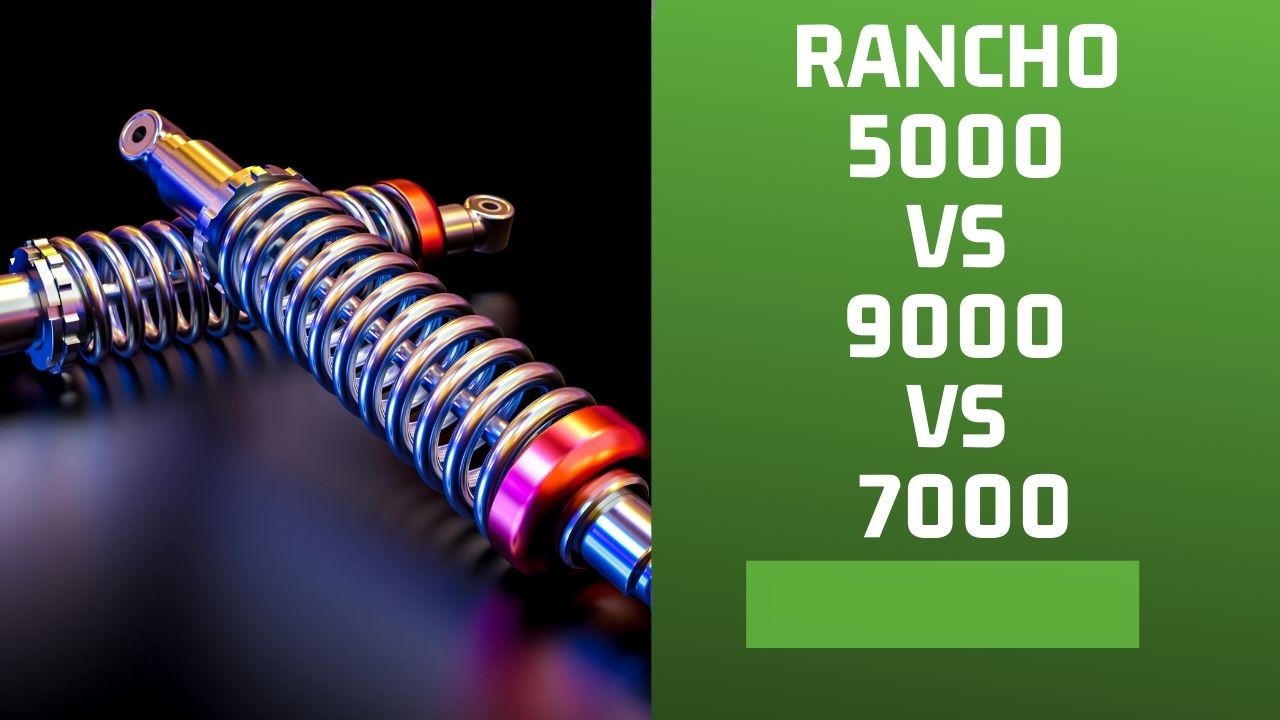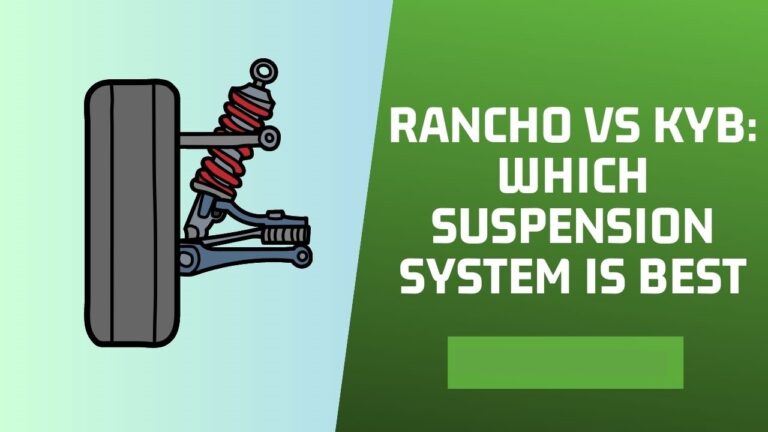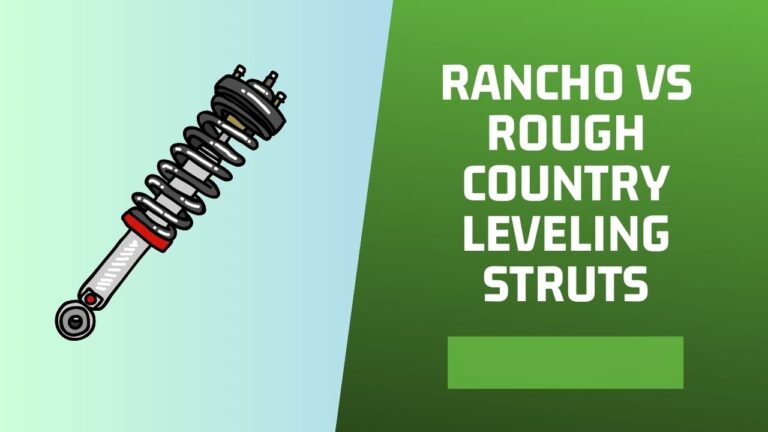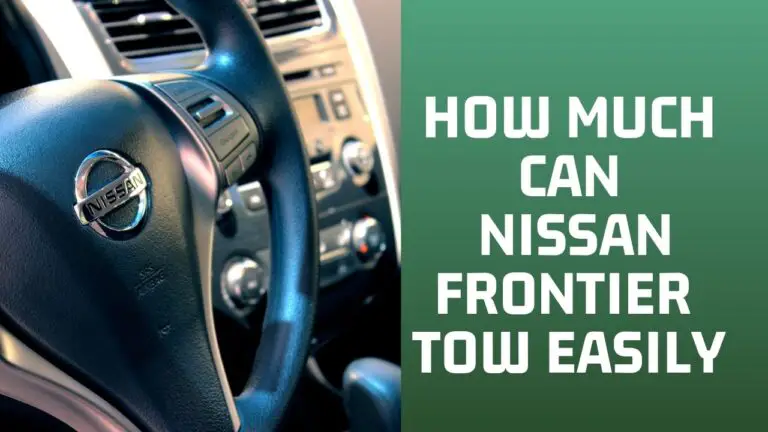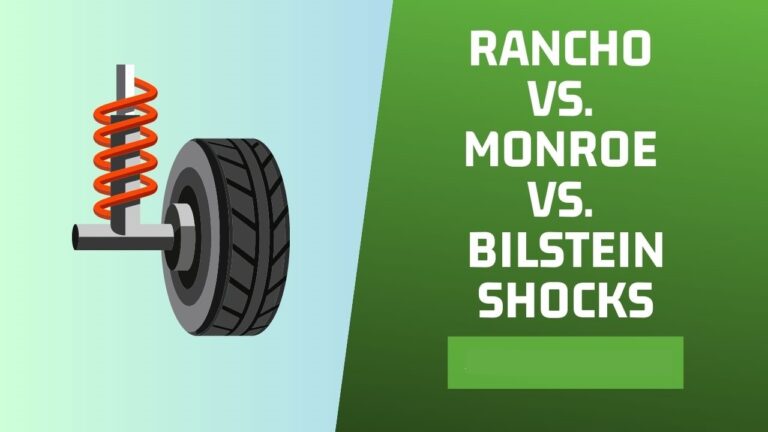The main difference between the 5000 and 9000 is that the 9000 is adjustable (valving wise) but the 5000 is not. However, the shock in both the RANCHO 5000 and RS 9000 are the same.
While the 5000 is a soft low pressure-charged shock and would bounce off for what seems like a full minute after a bump.
The 7000 on the other hand, is a firmer ride, think like a Bilstein, but with a different charge.
From experience, the 7000’s are too stiff for a TJ. I would recommend going for the adjustable 9000’s; thank me later.
If you’re going to upgrade get the 9000’s and skip the 7000’s, if not, go with the 5000x. The main feature the 9000s have over the 5000s is the ability to adjust the dampening independently and very fast too depending on the current conditions.
To use them, just set them at 5 in front and 4 in the rear for DD. If you prefer the 9000’s as we recommend, you’d find out that it allows for rear rotation of can up to 180 degrees so that the adjustment knobs face forward so nothing can damage them.
Rancho 5000 vs. 7000 vs. 9000 – Which is Best?
For infrequent towing and off-roading, go for the Rancho RS5000. In my experience, the ride on the hwy is a bit on the stiff side but if I go and bomb down a logging road, they are too soft. Or if I am towing over a rough terrain, I feel them getting overworked.
The Rancho RS 9000 is for more serious people. I have seen what it can do, and trust me, it gives a whole new meaning to ride quality vs towing and off-roading. They’re fully adjustable too and lets you enjoy a smooth OE ride.
The Rancho RS7000, is at a point between the 5000 and the fully adjustable 9000 and are worth consideration.
Features |
Rancho RS5000 |
Rancho RS 7000 |
Rancho RS 9000 |
| Debut | Since 1985 | 2011 | Released back in 2014 |
| Surface Design | Low pressure-charged Twin-tube body | Monotube design with high pressure nitrogen gas charge | Rancho 9000 shocks jeep jk are gas charged |
| Dimensions | 21inches of extended length | 46mm bore monotube construction | 24.2 x 3.3 x 3.3 inches |
| Piston length | 35mm diameter piston | 1.97 inch (50 millimeter) body diameter | Approx. 60mm |
| Overall weight | 4 pounds | 5 pounds | 7 pounds |
| Gas-Pressurized mechanics | No | Yes | Robust gas chamber |
| Protective Boot compatibility | Included | Protective boot included | Rancho RS 9000 is fully equipped |
| Valving setup | 10 stage valving | Ten-stage velocity sensitive valving | Nine levels of adjustment |
| Vehicle Type | Mostly on-road trucks and SUVs | Both On-road & off-road Jeeps, trucks & SUV | Both On-road & off-road Jeeps, trucks & SUV |
| Milage | 50-70k miles | 50-95k miles | 50-100k miles |
| WHERE TO BUY | CHECK ON AMAZON | CHECK ON AMAZON | CHECK ON AMAZON |
You would agree with us at this point that the Rancho RS5000 specs make it an ideal shock absorber for jeeps with stock height and moderate towing.
There isn’t much difference between these three in terms of mileage, and as long as you stay on-road, the Rancho RS5000 front and the rear set will let you enjoy decent feedback.
With that said, the Rancho 9000 steering stabilizer from experience is somewhat heavier and will let you enjoy a better wheeling experience.
The Rancho 9000 is gas charged and boasts 9 levels of a valve adjustment, so yes, you can try Rancho 9000 shocks Jeep JK now.
ALSO SEE: 700 Jeep Names
Rancho RS5000 Shock Absorbers Spec Overview
The RS 5000 is one popular choice of shock absorber unit by truckers and jeep lovers these days. This model is both tried, tested, and trusted. It features a twin-tube body with a base valve and the primary piston, that forces hydraulic fluid as it travels through the valve.
This aids truck and jeep dampening as you move it through any tropical zone.
Rancho RS5000 vs. RS5000x Comparison
Another common debate is the argument of the better one between the X version and the regular RS5000.
What is the difference between Rancho RS5000 and RS5000X?
The difference between the RS5000x and RS5000 is that the Rancho RS5000X is gas-charged (a total of 150psi gas charge), while the RS5000 variant is a hydro-damped only absorber.
You can tell the gas charge level by the expansion of the rod itself. In the past, hydro-damped absorbers couldn’t self-expand since there was no gas release functionality built inside it. But that is slowly changing with the new-gen RS5000X capable of easy transition.
Rancho RS9000 Shock Absorber Spec Overview
In terms of the Rancho 5000 vs. 7000 vs. 9000, the RS 9000 has more features in line with the 7000 than the 5000 model in my opinion.
It boasts of a gas-charged twin-tube shock absorber with a somewhat beefy body. With a two and a quarter-inch of surface.
The Rancho RS 9000 can be used for several applications. Some jeeps aren’t even compatible with such thick of a shock. But, no matter, the Rancho 9000 offers a great set of customizations.
It also comes with an adjustment knob as well as a base valve connected with main setup for more rugged jeeps.
How to Adjust Rancho 5000 Shocks In 2022?
- Pull your vehicle on a flat level surface
- Next, chalk the tires, so the jeep remains in position.
- Begin lifting it up, then pull out the parking brakes while still lifting for extra safety.
- Now that the vehicle is lowered down, take away the OE shock by separating the two nuts/bolts at the top.
- Use a couple of 48ft torque upper and 89ft LB nuts to attach the Rancho shocks rebate.
Sadly, the Rancho shocks rs5000 front and rear set aren’t fully adjustable, so you won’t be able to valve it up or down to your use case.
We hope that this provided you with some insight into how to adjust Rancho 5000 shocks.
Rancho 5000 vs Bilstein 5100
Piston Size |
Rod Size |
Finish |
Body Material |
Shock Design |
|
| Rancho 5000 | 35mm | 16mm | Painted | Steel | Monotube |
| Bilstein 5100 | 46mm | 14mm | Zinc | Steel | Monotube |
Bilstein 5100 is a better shock IMHO, but stiff stiff while the Rancho 5000 is a smoother ride.
Are Rancho RS5000 Shocks Gas Charged?
Rancho RS5000 shocks are gas charged. They work by compressing the molecules of nitrogen that are contained under pressure. Once the nitrogen is released into the spring, it is able to provide and maintain consistent resistance with every bump in the road.
How Good are Rancho 9000 Shocks?
Rancho 9000 shocks are well-known for being a great upgrade to the vehicle. They can make a car handle better and have less body roll. They also produce more control and help the car to feel more responsive.
Rancho 9000 shocks are a pricey upgrade, but they are worth it.
How Many Miles do Rancho Shocks Last?
Rancho Adjustable shocks last, ranging from 50-100k miles. There are many factors that play into how long a Rancho shock lasts. A lot of the factors are environmental, like how often you go off-road, how fast and hard you drive on the road, what type of terrain you drive on, etc.
How Can I adjust Rancho 9000 XL
If your Rancho 9000 xl is not working properly, it is usually because the adjustment knob has been moved out of position. To fix this problem, remove the lock knob and then turn the adjustment knob with a wrench until it contacts the stop bolt. Put the lock knob back on to ensure that it will not move again without you turning it.
Do Rancho Shocks Lift Your Truck?
Rancho is a leading brand of aftermarket automotive suspension systems. One of the most popular Rancho products is the Z3 Suspension System.
This system comes with a pre-set level of lift and offers many tuning options.
It is also highly customizable and can fit many different types of vehicles. The Z3 system is designed to be as comfortable as possible while adding some serious height to your vehicle.
Are Rancho Shocks Good for Off-Road?
Rancho shocks are designed for off-road vehicles and come in three different options: 5000, 7000, and 9000. The Rancho 9000 is the most expensive of the three. The Rancho 7000 is the next cheapest. The Rancho 5000 is the cheapest.
Where is Rancho Shocks Made?
Australia.
Are Rancho shocks Good for Jeep?
Rancho shocks ride so great. They have proven to be able to handle the abrupt bumps in the road so much better than the stock shocks. I am by far most impressed with the ride.
How do You Attach Boots to Rancho Shocks
Rancho shocks are often mounted on the back of a vehicle. There are two ways to attach your boots. One way is to use a bolt, nut and washer that you can find at any hardware store.
The other method is to take the boots and put them over the shock shafts, then use a wrench to tighten the locking ring until it couldn’t be tightened any more.
What Setting Should Rancho 9000 Shocks be Set At?
Rancho 9000 shocks have preset settings. The first setting, 5000, is for a lighter vehicle that may need less shock absorption. For heavier cars that are driven less often, 7000 is recommended.
Finally, 9000 is for a heavier vehicle that’s driven more than the other two settings.
When installing the shocks, it’s important to match the number to the weight of the vehicle or else they won’t work correctly.
Final Verdict
We hope you enjoyed our Rancho 5000 vs 7000 vs 9000 COMAPRISON. We have shared real experience in the use of various Rancho shocks reviews.
Before purchasing either one (Rancho 9000 vs. 5000), remember that not every option is available for every platform. So, any older models like a Broncho won’t cope with the RS 9000 and vice versa.
That’s why only choose Rancho RS5000 specs if it fits your specific application or need.
Either way, there isn’t necessarily a winner in the Rancho 5000 vs. 7000 vs. 9000 debate, as they can all get the job done depending on the need, budget and implication.

